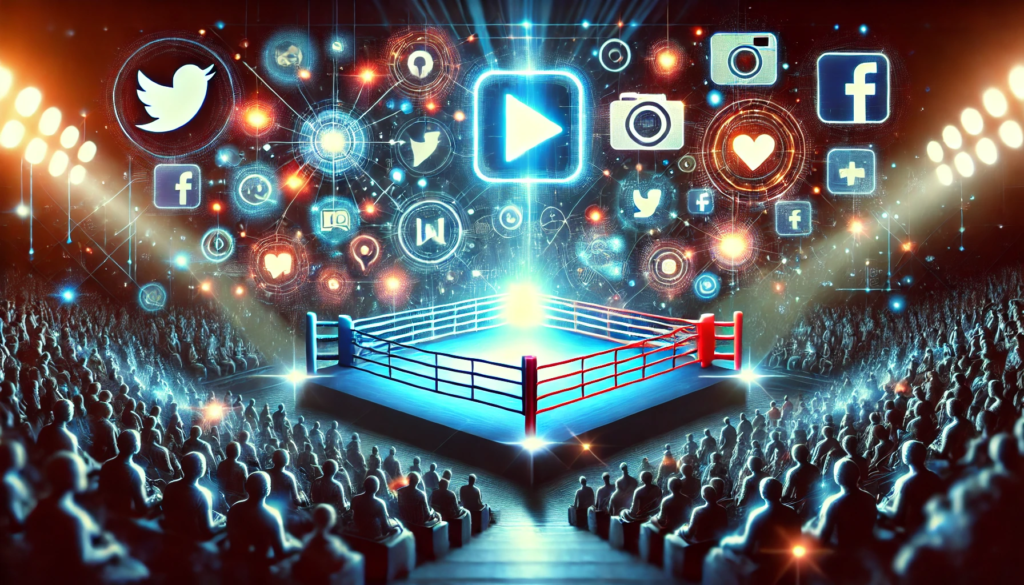Boxing has always been about the drama—the big fights, the rivalries, and the unforgettable moments that keep fans coming back for more. But these days, the sport isn’t just fought in the ring; it’s being played out online. Social media has taken centre stage in boxing, reshaping everything from fight promotion to how fans connect with their favourite fighters. Whether it’s building hype, discovering new talent, or causing controversy, the role of social media within boxing is bigger than ever—something you can explore further here.
Building Hype Like Never Before
Social media has become the ultimate tool for fight promotion. Back in the day, you’d see posters, TV ads, and press conferences hyping up the next big bout. Now, all it takes is a well-timed tweet, a viral Instagram reel, or a fiery call-out video on TikTok to set the internet ablaze.
Look at Tyson Fury vs Francis Ngannou. This wasn’t just a boxing event; it was a social media spectacle. The buzz didn’t come from traditional media—it came from the viral clips, memes, and behind-the-scenes videos flooding timelines everywhere. Social media in boxing has created a new kind of fan engagement, pulling in not just hardcore enthusiasts but also casual viewers who might only tune in because the fight was trending.
But is all this buzz good for boxing? Sure, it creates excitement, but sometimes the hype can overshadow the actual fight. How many times have we seen a bout hyped up online, only to leave fans feeling underwhelmed when the punches actually start flying?
Giving New Fighters a Fighting Chance
Social media isn’t just helping big names—it’s also giving lesser-known fighters a platform to shine. Back in the day, if you weren’t backed by a big promoter, it was tough to get noticed. Now, with platforms like Instagram, YouTube, and TikTok, fighters can build their own audiences and take control of their careers.
Ryan Garcia is a prime example. Before headlining major events, he was already making waves on Instagram with his lightning-fast combos and slick training videos. His ability to connect with fans online turned him into a star long before the big promoters took notice.
Social media in boxing is also putting a spotlight on fighters from regions that have traditionally been overlooked. Whether it’s showcasing talent from Africa, Eastern Europe, or Southeast Asia, social platforms are giving fans access to fighters they might never have seen otherwise.
The Rise of Celebrity Boxing
Of course, we can’t talk about social media and boxing without mentioning the rise of influencer and celebrity fights. Platforms like YouTube and TikTok have given us a new breed of boxer—fighters who are better known for their follower count than their skills in the ring.
Take Jake Paul, for example. Love him or hate him, you can’t deny the attention he’s brought to the sport. His fights bring in millions of viewers, many of whom might not have watched boxing otherwise. But while these events bring fresh eyes to the sport, they also raise questions about its integrity. Are these matches good for boxing, or are they turning it into a circus?
The Pressure of Being Online
For fighters, social media is a double-edged sword. On one hand, it’s a way to connect with fans, build a brand, and stay relevant. On the other, it opens them up to constant scrutiny. Every loss, every misstep, every post is picked apart by millions of fans and critics.
Anthony Joshua has spoken openly about the pressures of being in the public eye, especially after high-profile losses. Fighters aren’t just judged for their performance in the ring anymore; they’re judged for everything they say and do online. This can take a serious toll on their mental health, adding another layer of stress to an already demanding profession.
Keeping the Sport’s Traditions Alive
Boxing is a sport built on tradition, and as much as social media has changed the game, it’s important to keep those traditions alive. Social media in boxing doesn’t have to mean abandoning what makes the sport special. Instead, it should be about enhancing the experience—telling fighters’ stories, building rivalries, and connecting fans to the action in new and exciting ways.
For fighters, it’s about finding the balance. Use social media to promote yourself and engage with fans, but don’t let it distract from the hard work and discipline it takes to succeed in the ring. For fans, it’s about enjoying the memes, the call-outs, and the hype, but remembering that the real magic of boxing happens when the bell rings.
Final Thoughts
Social media has brought a lot to boxing—more fans, more opportunities for fighters, and more ways to engage with the sport. But it’s also brought challenges, from prioritising spectacle over skill to the mental toll it takes on athletes.
If boxing can find the right balance between tradition and innovation, the future looks bright. Social media in boxing doesn’t have to dilute the sport’s roots; it can amplify what makes it great. Let’s hope the next generation of fighters, promoters, and fans can make the most of it.

